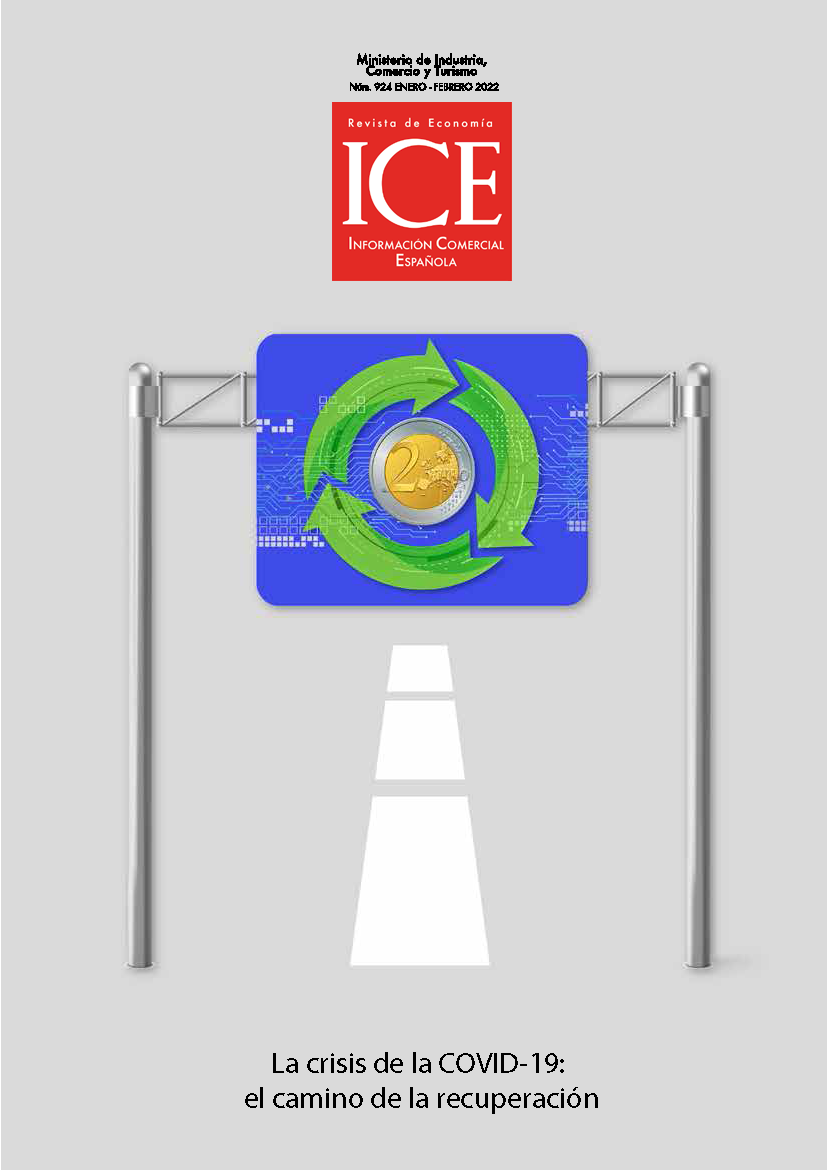The global recovery from COVID-19
##plugins.themes.bootstrap3.article.sidebar##
Descargas
##plugins.themes.bootstrap3.article.main##
La pandemia de COVID-19 ha tenido un impacto económico significativo en todo el mundo, mucho mayor que durante la crisis financiera mundial de 2008-2009. A mediados de 2021, el Producto Interior Bruto (PIB) mundial superó su nivel previo a la pandemia, pero la recuperación ha perdido impulso y sigue siendo muy desigual, con resultados sorprendentemente diferentes entre países, sectores y grupos demográficos. Dada la recuperación mundial desigual e incompleta, los gobiernos deben mantener políticas de apoyo y flexibles que puedan adaptarse a la evolución económica y que mejoren las perspectivas de un crecimiento sostenible e inclusivo.
##plugins.themes.bootstrap3.article.details##
Andrews, D. & Criscuolo, C. (2013). Knowledge-Based Capital, Innovation and Resource Allocation. OECD, Economics Department Working Papers No. 1046. OECD Publishing, Paris. https://dx.doi.org/10.1787/5k46bj546kzs-en
Andrews, D., Criscuolo, C. & Gal, P. N. (2016). The Best versus the Rest: The Global Productivity Slowdown, Divergence across Firms and the Role of Public Policy. OECD, Productivity Working Papers No. 05. OECD Publishing, Paris. https://dx.doi.org/10.1787/63629cc9-en
Auerbach, A. J., Gorodnichenko, Y., McCrory, P. B. & Mruphy, D. (2020). Fiscal Multipliers in the COVID19 Recession. Berkeley University, First draft - 2020-12-01. https://www.berkeley.edu/
Auerbach, A. J., Gorodnichenko, Y., McCrory, P. B. & Mruphy, D. (2021). Fiscal Multipliers in the COVID19 Recession. Berkeley University, WorkingDraft - 2021-09-26. https://www.berkeley.edu/
Bergeaud, A., Cette, G. & Lecat, R. (2016). Productivity trends in advanced countries between 1890 and 2012. Review of Income and Wealth, 62(3), 420-444.
Carcillo, S., Fernández, R., Königs, S. & Minea, A. (2015). NEET Youth in the Aftermath of the Crisis: Challenges and Policies. OECD Social, Employment and Migration Working Papers No. 164. OECD Publishing, Paris. https://dx.doi.org/10.1787/5js6363503f6-en
Cournède, B., Denk, O. & Garda, P. (2016). Effects of Flexibility-Enhancing Reforms on Employment Transitions. OECD, Economics Department Working Papers No. 1348. OECD Publishing, Paris. https://dx.doi.org/10.1787/bd8e4c1f-en
Deb, P., Furceri, D., Ostry, J. D., Tawk, N. & Yang, N. (2021). The Effects of Fiscal Measures During COVID-19. IMF, Working Paper No. 262.
Fernández Alvarez, C. & Molnar, G. (2021). What is behind soaring energy prices and what happens next? IEA, Commentary. https://www.iea.org/commentaries/what-is-behind-soaring-energy-prices-and-what-happens-next
G20. (2020). Access to Opportunities for All Menu of Policy Options.
Gourinchas, P. O., Kalemli-Özcan, S., Penciakova, V. & Sander, N. (2021). Fiscal Policy in the Age of COVID: Does it ‘Get in all the Cracks?’ NBER, Working Paper No. 29293.
Guilloux-Nefussi, S. & Rusticelli, E. (2021). Supply-side disruptions are dragging down the automotive sector. OECD Ecoscope blog.
OECD, Organisation for Economic Co-operation and Development. (2016). The NEET challenge: What can be done for jobless and disengaged youth? In OECD, Society at a Glance 2016: OECD Social Indicators (pp. 13-68). OECD Publishing. https://dx.doi.org/10.1787/soc_glance-2016-4-en
OECD, Organisation for Economic Co-operation and Development. (2019). Economic Policy Reforms 2019: Going for Growth. https://dx.doi.org/10.1787/aec5b059-en
OECD, Organisation for Economic Co-operation and Development. (2020a). OECD Economic Outlook, Volume 2020 Issue 1, No. 107. OECD Publishing, Paris. http://dx.doi.org/10.1787/0d1d1e2e-en
OECD, Organisation for Economic Co-operation and Development. (2020b). New horizons: Structural policies for a strong recovery and a sustainable, inclusive and resilient future. OECD Publishing, Paris.
OECD, Organisation for Economic Co-operation and Development. (2020c). Public employment services in the frontline for employees, jobseekers and employers. OECD, Policy Responses to Coronavirus (COVID-19). https://www.oecd.org/coronavirus/policy-responses/public-employment-services-in-the-frontline-for-employees-jobseekers-and-employers-c986ff92/
OECD, Organisation for Economic Co-operation and Development. (2020d). Distributional risks associated with non-standard work: Stylised facts and policy considerations. OECD, Policy Responses to Coronavirus (COVID-19). https://read.oecd-ilibrary.org/view/?ref=134_134518-2bfush541w&title=Distributional-risks-associated-with-
OECD, Organisation for Economic Co-operation and Development. (2021a). OECD Economic Outlook, Volume 2021 Issue 2, No. 110. OECD Publishing, Paris. https://doi.org/10.1787/edfbca02-en
OECD, Organisation for Economic Co-operation and Development. (2021b). OECD Economic Outlook, Volume 2021 Issue 1, No. 109. OECD Publishing, Paris. https://doi.org/10.1787/66c5ac2c-en
OECD, Organisation for Economic Co-operation and Development. (2021c). Economic Policy Reforms 2021: Going for Growth: Shaping a Vibrant Recovery. OECD Publishing, Paris. https://doi.org/10.1787/3c796721-en
Sorbe, S., Gal, P., Nicoletti, G. & Timiliotis, C. (2019). Digital dividend: Policies to harness the productivity potential of digital technologies. OECD, Economic Policy Paper No. 26. OECD Publishing, Paris.


